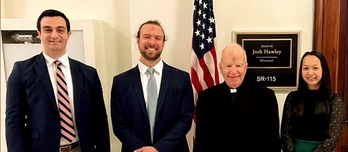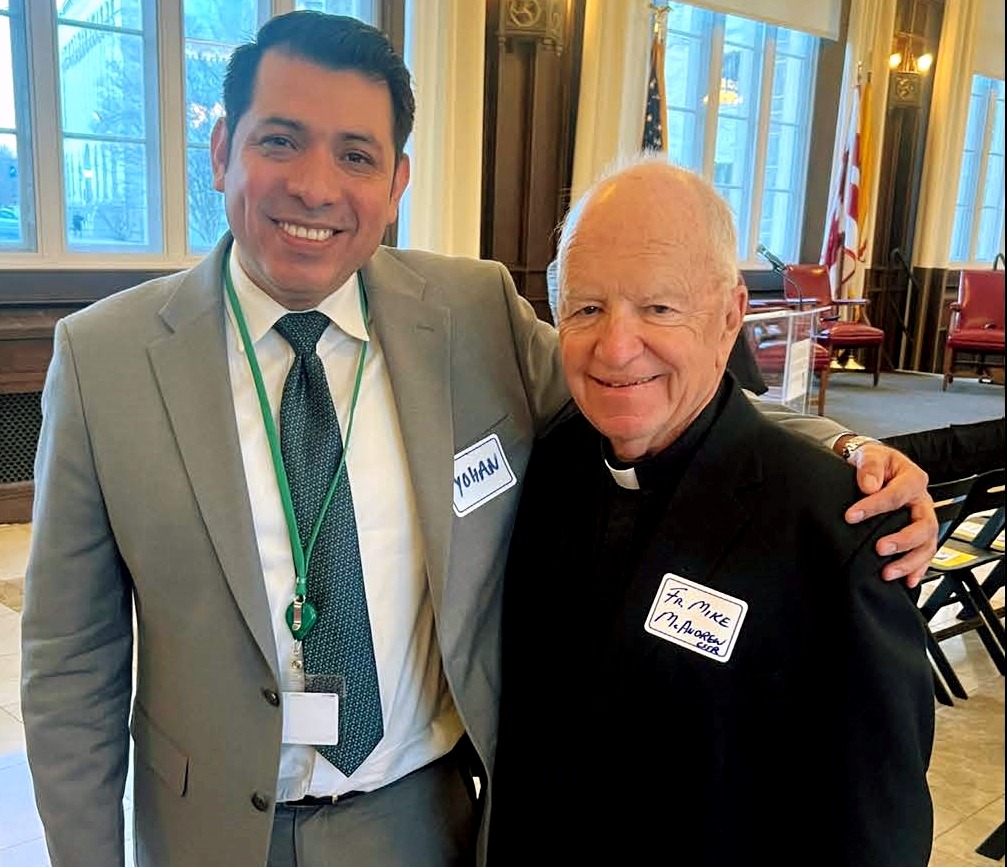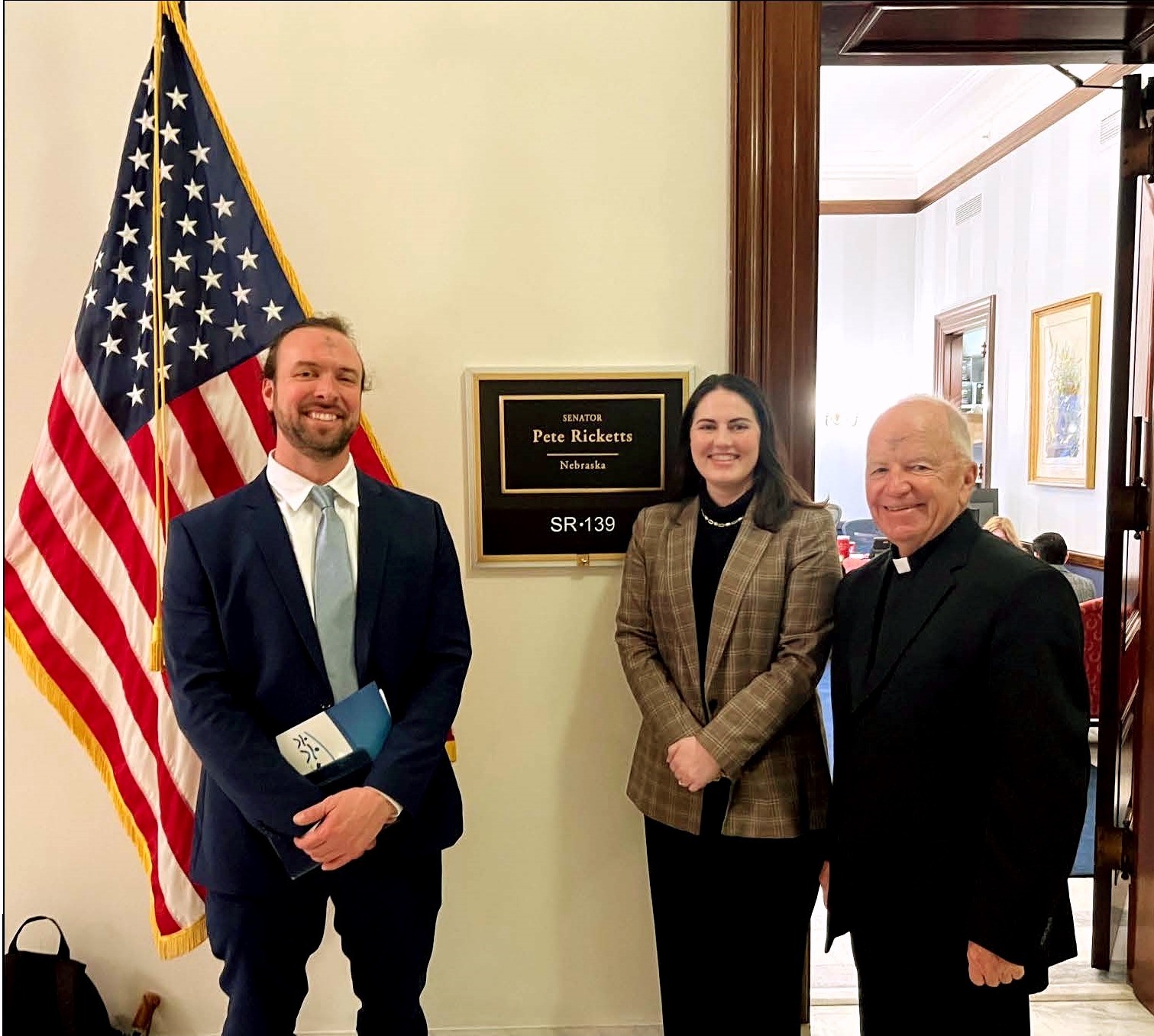National Migration Conference
-
 March 14, 2025Bishop Mark Seitz of El Paso was keynote speaker of the National Catholic Conference on Migration, which was a balancing act between uncertainty, fear and hope. Highly publicized actions taken by ICE and the extreme political rhetoric concerning migrants, refugees and immigrants brought together some of the most dynamic and influential people in the Church addressing migration in the United States today. It was an opportunity to create connections with people engaged globally in response to American and global migration.Bishop Seitz gave a few examples of caring for vulnerable refugees, who in previous times received positive responses to their crises. They received attention before the change in administration but remained in a ‘limbo’ status awaiting approval of their asylum petitions.In each case, he concluded, “they were deported.” Yet after sharing those stories he still asserted, “I still have hope.” He called us to be pilgrims of hope, because lack of hope is not a choice that we can make.
March 14, 2025Bishop Mark Seitz of El Paso was keynote speaker of the National Catholic Conference on Migration, which was a balancing act between uncertainty, fear and hope. Highly publicized actions taken by ICE and the extreme political rhetoric concerning migrants, refugees and immigrants brought together some of the most dynamic and influential people in the Church addressing migration in the United States today. It was an opportunity to create connections with people engaged globally in response to American and global migration.Bishop Seitz gave a few examples of caring for vulnerable refugees, who in previous times received positive responses to their crises. They received attention before the change in administration but remained in a ‘limbo’ status awaiting approval of their asylum petitions.In each case, he concluded, “they were deported.” Yet after sharing those stories he still asserted, “I still have hope.” He called us to be pilgrims of hope, because lack of hope is not a choice that we can make. Many of the services of the USCCB and Catholic Charities USA are affected by the cuts to services for immigrants, children, and the poor made by executive orders. People are dying already because of the denial of food and medicine. The recent executive orders not only deny the needs of the poor, but are destroying the infrastructures needed to provide lifesaving services.The event was an opportunity to meet national leadership in migration ministry expressing concern not only for the migrants, but for volunteers and service providers of humanitarian assistance. The effect of anti-immigrant rage causes fear for the migrants and stress for the service providers. We listened to service providers who have had to shut down services because of loss of staff essential to providing food, medical care, legal services and education for migrants and refugees.Appointments to visit the Congressional and Senatorial offices were scheduled for one full day of the conference − from 8:30 am to 6:00 pm. There was no general gathering of the conference members, and it rained most of the day.As part of the conference, we were encouraged to focus on support for the Dreamers (DACA) and care for child refugees and the children of parents without permanent status in the United States.The conference made clear that the challenges ahead for people concerned about migrants and immigrants is not about the ‘nuts and bolts’ of providing life-saving services, but a challenge to change minds, hearts and souls.
Many of the services of the USCCB and Catholic Charities USA are affected by the cuts to services for immigrants, children, and the poor made by executive orders. People are dying already because of the denial of food and medicine. The recent executive orders not only deny the needs of the poor, but are destroying the infrastructures needed to provide lifesaving services.The event was an opportunity to meet national leadership in migration ministry expressing concern not only for the migrants, but for volunteers and service providers of humanitarian assistance. The effect of anti-immigrant rage causes fear for the migrants and stress for the service providers. We listened to service providers who have had to shut down services because of loss of staff essential to providing food, medical care, legal services and education for migrants and refugees.Appointments to visit the Congressional and Senatorial offices were scheduled for one full day of the conference − from 8:30 am to 6:00 pm. There was no general gathering of the conference members, and it rained most of the day.As part of the conference, we were encouraged to focus on support for the Dreamers (DACA) and care for child refugees and the children of parents without permanent status in the United States.The conference made clear that the challenges ahead for people concerned about migrants and immigrants is not about the ‘nuts and bolts’ of providing life-saving services, but a challenge to change minds, hearts and souls. We need to provide crisis services for people on the periphery, but we also need to inform, motivate and support people to welcome the stranger. Listening to people who have served migrants for days, weeks and even months only to see the family be separated with some members deported, I hearken to when Fr. Leo Moctezuma and I visited shelters in 2022. A question that we often asked always brought tears to the eyes of those working in the shelters, “¿Quién sirve a los servidores?” (Who serves the servers of the migrants?)Migration ministry is not a peripheral work of charity, but needs to be a part of all ministry. It is not about the works of individual Redemptorist heroes of immigration like Frs. Leo Kulleck, Jimmy O'Connell, Joe Tobin (of California), Ricardo Elford, Russ Piedra (Baltimore) and others. Our ministry is about each and every Redemptorist serving the poor throughout our histories. Today, more than ever, all Redemptorists are needed to help change minds, hearts and souls to recognize Jesus in the migrant.
We need to provide crisis services for people on the periphery, but we also need to inform, motivate and support people to welcome the stranger. Listening to people who have served migrants for days, weeks and even months only to see the family be separated with some members deported, I hearken to when Fr. Leo Moctezuma and I visited shelters in 2022. A question that we often asked always brought tears to the eyes of those working in the shelters, “¿Quién sirve a los servidores?” (Who serves the servers of the migrants?)Migration ministry is not a peripheral work of charity, but needs to be a part of all ministry. It is not about the works of individual Redemptorist heroes of immigration like Frs. Leo Kulleck, Jimmy O'Connell, Joe Tobin (of California), Ricardo Elford, Russ Piedra (Baltimore) and others. Our ministry is about each and every Redemptorist serving the poor throughout our histories. Today, more than ever, all Redemptorists are needed to help change minds, hearts and souls to recognize Jesus in the migrant.
